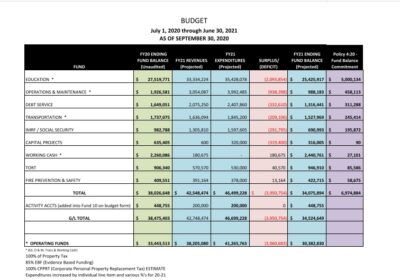Jacksonville School District 117 is planning for a deficit spending year as revenues fluctuate for governing bodies all across the state. District Chief Financial Officer Jamie Hadjan said at the special public hearing and board meeting last night that the FY21 budget was a giant puzzle to put together due to new distribution of property tax revenues, expected increases in district-wide salaries and benefits, and operations and maintenance expense increase due to COVID-19 mitigation.
According to a budget snapshot chart, the district is planning on a little over $3 million dollar deficit. District 117 Superintendent Steve Ptacek says it shouldn’t be looked at as a deficit or detriment to the district: “That’s actually not the way to look at it. We do this every year. We always under estimate our revenues and overdo our expenditures. We have had a $3-4 million deficit all of the last 8 years that I’ve been here and the last 7 years that chief financial officer Jamie Hadjan has been here. At the end of the year, we end up with an excess of money. Just in my opinion, it’s proper budgeting that we prepare for the worst. We still plan on being somewhere around flat this year.
Ptacek says COVID-19 didn’t really factor into causing a hole in the budget. He says the future worries are coming with state revenues: “We actually looked at the budget, and it’s not effecting it as much as people think. A lot of the things that COVID has brought or is bringing are being paid for through grant money. I think the biggest worry we have got is this year, at this point in time with COVID, it’s the impact on the state’s budget going into next year and over the next 5-6 years. That’s the actual worrisome part.”
Ptacek says that the tax levy caps on school districts can guarantee that a property tax increase is coming each year because schools need the funding. Currently, Jacksonville School District 117 accounts for approximately 30-40% of Jacksonville citizens’ property tax bills. He says that the district’s reserves are currently in decent shape to cover any additional expenditures, but the main worry for the reserves relies on whether if prorated funding occurs at the state level due to their financial losses.
In other board action at the special meeting, they accepted the bid from Missouri Floor Company from St. Louis, Missouri to replace The Bowl floor to its original specifications with a cost of $146,600. Hadjan told the board that the insurance had accepted the bid and that the wood for the floor is likely to come in at the end of October for installation. She did not have a timetable as to when the floor would be complete and ready for use.




